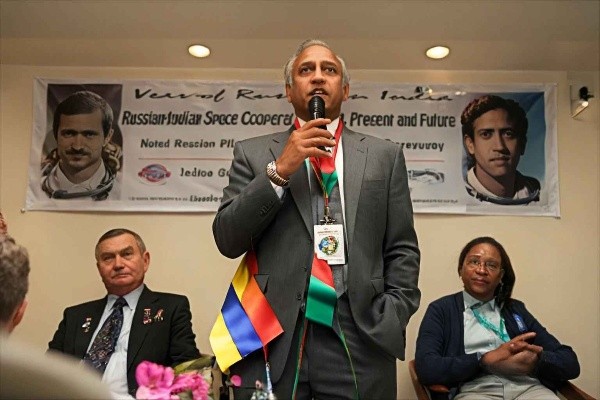A Historic Journey into Space
On April 3, 1982, Rakesh Sharma made history as the first Indian to travel to space, flying aboard the Soyuz T-11 alongside two Soviet cosmonauts, Commander Yury Malyshev and Flight Engineer Gennady Strekalov. This monumental journey took Sharma to the Salyut-7 space station, where he spent eight days conducting experiments, photographing India from above, and practicing yoga to study the effects of weightlessness on the human body. At the time, Sharma was a 35-year-old pilot in the Indian Air Force (IAF), chosen for this prestigious mission after rigorous training in Russia.
Reflecting on his training, Sharma recalls the challenges he faced, particularly the language barrier and the harsh Russian winters. “Ravish and I did not know even a single word of the language, though the entire training was conducted in Russian,” he shared in an exclusive interview. Despite these difficulties, he found camaraderie with his Russian colleagues, noting their emotional and simple nature, akin to that of Indians.
A Philosophical Perspective from Space
Upon reaching the Salyut-7 station, Sharma experienced a profound moment when he was greeted by the five Russian cosmonauts already aboard. This encounter marked a significant milestone, as it was the first time such a large number of space travelers orbited Earth together. The Salyut space stations, launched by the Soviet Union, served as vital platforms for scientific research and exploration.
Sharma’s time in space offered him a unique perspective on humanity. “When you go up to space and look down at Earth, you won’t see the boundaries,” he reflected. This realization has fueled his advocacy for international collaboration in space exploration, emphasizing that competition among nations could lead to conflicts that extend beyond Earth.
Advocating for Global Cooperation
Sharma believes that the root causes of conflict on Earth stem from the inequitable distribution of wealth. He warns that if countries compete for resources in space, the same conflicts could arise there. “If we continue to go there with our national flags on our shoulders and start bringing stuff back for the exclusive use of our people, then conflict will affect space too,” he cautioned.
His vision for the future of space exploration involves joint initiatives where countries collaborate and share resources. “If countries cooperate and explore space together, it would remove the root cause of conflict,” he stated. Sharma argues that no single nation possesses all the necessary capabilities for space exploration; instead, each country excels in specific areas. For instance, India is known for its satellite technology, while Russia has expertise in long-duration human spaceflight.
Inspiring the Next Generation
Sharma frequently interacts with students, igniting their enthusiasm for space travel. He encourages young people to pursue careers as pilots, researchers, or scientists, as these skills will be essential for future colonization efforts on the Moon and Mars. However, he also emphasizes the challenges of space travel, reminding them that it requires resilience and adaptability.
During his historic mission, Sharma famously captured the hearts of millions when he described India from space to then-Prime Minister Indira Gandhi, quoting the renowned poet Iqbal: “Saare Jahan Se Accha,” meaning India looks better than the whole world. This moment remains etched in his memory, as he reflects on the passage of time since that extraordinary day.
A Lasting Legacy
Upon returning from his mission, Sharma was honored with the prestigious title of Hero of the Soviet Union, solidifying his connection to Russia. He recalls his experiences flying Russian aircraft during his IAF career and acknowledges the role of Russian technology in his survival during combat missions.
As he reminisces about his late colleagues, Malyshev and Strekalov, Sharma expresses a deep sense of loss. “I miss them dearly. I feel their loss deeply,” he said, highlighting the bonds formed during their shared journey into the cosmos.
In a world increasingly focused on competition, Rakesh Sharma’s message of collaboration and unity in space exploration serves as a reminder of our shared humanity and the potential for peaceful coexistence beyond our planet.








